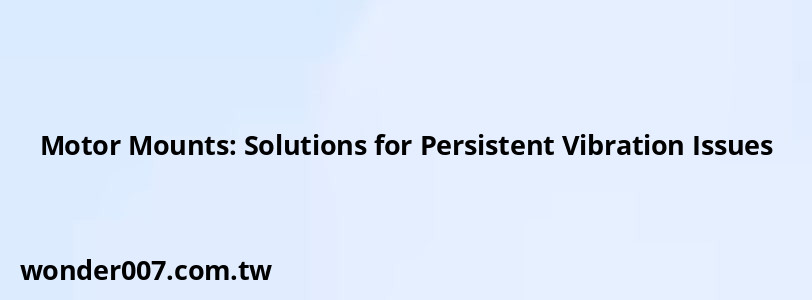Motor Mounts: Solutions for Persistent Vibration Issues
290
0

When you replace your motor mounts and still experience vibrations, it can be frustrating. Understanding the potential causes and solutions is essential for resolving this issue effectively.
Understanding Motor Mounts and Vibrations
Motor mounts are designed to secure the engine and transmission to the vehicle's frame while absorbing vibrations. If your vehicle continues to vibrate after replacing these mounts, it may indicate several underlying issues.
Possible Causes of Vibrations After Replacing Motor Mounts
- Improper Installation: If the motor mounts were not installed correctly, it could lead to misalignment, causing vibrations. It's crucial to ensure that all bolts are tightened in the correct sequence and that the mounts are in a neutral position during installation.
- Worn Components: Other components such as the transmission mount or bushings may also be worn or damaged. These parts work in conjunction with the motor mounts, so their condition can significantly affect vibration levels.
- Engine Imbalance: An imbalance in the engine itself, possibly due to issues like a failing fuel injector or spark plug, can lead to increased vibrations. This is often overlooked but can be a significant contributor.
- Aftermarket Parts: If you installed aftermarket motor mounts, they might not be as effective at dampening vibrations as OEM parts. Some aftermarket options can transmit more noise and vibration due to their design.
Solutions to Reduce Vibration
To address persistent vibrations after changing your motor mounts, consider the following approaches:
- Recheck Installation: Ensure that all mounts are properly aligned and tightened according to manufacturer specifications. A common method is to install the mounts loosely, then power brake the vehicle in both forward and reverse to settle them before fully tightening.
- Inspect Related Components: Check other related components for wear and tear. This includes inspecting transmission mounts, bushings, and even engine components for signs of damage or wear.
- Consider Upgrading Mounts: If aftermarket mounts are causing excessive vibration, consider switching back to OEM parts or high-quality alternatives that are specifically designed to minimize noise, vibration, and harshness (NVH).
- Engine Diagnostics: Conduct a thorough diagnostic check of the engine. Look for any issues that could cause imbalance or excessive vibration during operation.
FAQs About Motor Mounts and Vibration
FAQs About Motor Mounts
- Why do I still feel vibrations after changing motor mounts?
Improper installation, worn components, engine imbalance, or using ineffective aftermarket parts could be reasons. - How can I ensure my motor mounts are installed correctly?
Follow the manufacturer’s installation instructions carefully, ensuring all bolts are tightened in the correct sequence. - What should I do if my engine continues to vibrate?
Inspect related components for wear, consider upgrading your mounts, and perform engine diagnostics.
By addressing these factors systematically, you can significantly reduce or eliminate unwanted vibrations in your vehicle after replacing motor mounts.
Related Posts
-
Motor Hyundai Santa Fe 3.3 V6
31-01-2025 • 183 views -
Hyundai Santa Fe Alarm: Troubleshooting Common Issues
30-01-2025 • 224 views -
2014 Mazda 6 Radio Issue: Causes and Solutions
28-01-2025 • 241 views -
Engine Fan Stays On: Causes and Solutions
29-01-2025 • 205 views -
2004 Chevy Silverado 2500HD Front Bumper: Overview and Solutions
28-01-2025 • 195 views
Latest Posts
-
Are O2 Sensors Covered Under Warranty
01-02-2025 • 444 views -
Rear Brake Caliper Piston Won't Compress
01-02-2025 • 421 views -
2015 Chevy Traverse AC Recharge Port Location
01-02-2025 • 483 views -
How To Turn Off Paddle Shifters Mercedes
01-02-2025 • 455 views -
Power Steering Fluid Leak On Passenger Side
01-02-2025 • 530 views
Popular Posts
-
V12 Engine Costs: What You Need to Know
26-01-2025 • 767 views -
BMW X5: Fuel Tank Capacity and Specifications
28-01-2025 • 712 views -
Hino Warning Lights: Understanding Dashboard Alerts
26-01-2025 • 947 views -
Toyota Hiace: Fuel Efficiency Insights for 2025
26-01-2025 • 790 views -
EPC Light: Understanding Causes and Solutions
26-01-2025 • 1149 views
